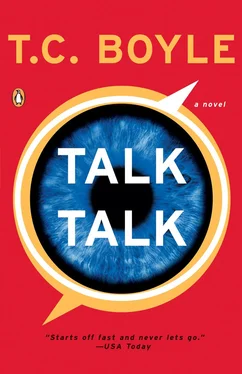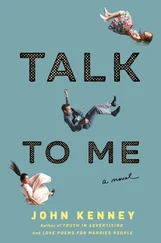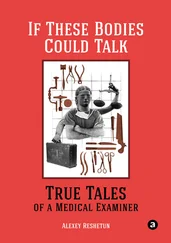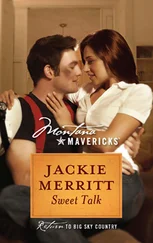“I want to go out to the lake when this is over,” she said. “Or, I mean, when we're done here.”
They were sitting in the car beneath one of the big shade trees planted in some long-gone era of boosterism and hope, and Bridger had a map of the town spread across his lap. He looked up at her out of his too-broad face and ran a hand through his hair. “What lake? What are you talking about? You mean the river?”
She watched for the words, but already the impulse was dying away. After a moment, after he'd turned back to the map, she said, “Never mind. It's not important.”
On the way up from the city she'd quizzed him about her mother and how they'd seemed to get along so famously. “What did you talk about?” she asked him.
He was squinting against the glare of the road, his eyes jumping to the mirrors and back-traffic was heavy and it made him tentative. “You,” he said. “What else?”
“Yes?” She laid a hand in his lap and he glanced at her before coming back to the road. It was muggy, overcast, threatening rain. “Tell me. What did she say?”
She couldn't read him in profile, but she saw his lips move.
“I didn't hear you,” she said. “What?”
He swung his face to her, gave a little smile. “She said you were stubborn.”
“Me? Don't believe everything you hear, my friend, especially considering the source. Especially from your girlfriend's mother-”
“Girlfriend? I thought you were my fiancée?”
“Your fiancée's mother.” She glanced out the window on vegetation so dense they could have been in the Amazon-less than ten miles from the city and there was nothing visible but a fathomless vault of green. “So I'm stubborn, huh?” she said, turning back to him. “What brought that up?”
A shrug. “I don't know. That first night, when you did the dishes and went to bed right after we ate-?”
His head was tilted forward, eyebrows cocked. Was he asking a question or making a statement? “I'm not following you,” she said.
He glanced tensely at the rearview, then brought his face round so she could see the words: “When-you-were-in-bed.”
“Yes?”
“Cochlear implants. She said you wouldn't even go in to get examined.”
It took her a moment, the sweet smell of chlorophyll flowing at her through the vents, the sky closing in, darkening like a spread umbrella. She said, “She would think that. She was always pushing, pushing. But you don't understand-she didn't understand. It was my decision and nobody else's.”
“What about now? Would you do it now?”
She let out a laugh, the kind of laugh that was meant to be bitter, mocking, but it might have sounded like a scream for all she knew. “No way,” she said, and she relished the brevity and finality of the phrase, so much intransigence packed into two little syllables.
“Why not? Other people-”
She signed it: “You sound like my mother”.
He gave her a look and took both hands from the wheel. “Other people do it,” he signed. “Why don't you? Then”-the car began to drift and he made a quick grab for the wheel-“then we could talk,” he said aloud, his eyes darting to the rearview mirror.
“We are talking.”
“You know what I mean.”
“No,” she said. “No, I don't. You mean I have to talk on your terms, in your language, is that what it is?”
“It's just that it could be better, that's all I'm saying.”
“Listen,” she said, “even if I wanted to let somebody open up my head, and I don't-would you want somebody to open up yours? Even if I did, even if I could hear something, anything, the best things in the world-music, my own lover's voice, your voice-I wouldn't do it. This is me. If I could hear, even for an hour, a minute, I'd be somebody different. You understand what I'm saying?”
He nodded, but his eyes had that vague look, as if she were speaking in some foreign language, and then he snatched them away and focused on the car ahead of him. Maybe he hadn't heard her properly, maybe that was it. Whenever she got passionate, whenever she got wound up, she tended to garble her words. She repeated herself, the whole speech, because her mother was wrong-she wasn't stubborn, just determined. And decisive. Even as a child she'd known which world she wanted to live in-the world she'd created for herself, the one she'd built block by block around her till it was impenetrable-and there was no one, not her mother or father or the nimblest and most persuasive audiologist in the world, who could tell her different.
Now, sitting in the car beneath the tree in the midday swelter while Bridger frowned over the map, she came back to the present and thought of what they were doing, what they were about to do, and felt her heartbeat quicken. There were two Calabreses listed in the Peter-skill directory, an F.A. at 222 Maple Avenue and an F.R. at 599 Ringgold Street. “Which one do we do first?” Bridger asked, turning to her, his finger stabbing at the map. “This one”-she saw the diagonal slash of the road heading southeast, out of town-“is F.A., and this”-his finger slid across the map, indicating a street due south of where they were-“is F.R. Looks like F.A. is closest, but it doesn't really matter because the town isn't all that big… What do you think-you choose.”
“I don't know, it's a toss-up,” she said, and the image of the flipped coin rose and settled in her mind. “F. A., I guess.”
Bridger looked over his shoulder, put the car in drive and swung out onto the nearly deserted main street of Peterskill, and she asked herself why she was so keyed up, so nervous, why her hands had begun to tremble and she was having trouble catching her breath. They didn't even know if the guy's name “was” Frank Calabrese-it could have been just another one of his aliases-and whether or not he was headed for Peterskill, no one could say. That was just their best guess. There was the evidence of the police report Milos had given them “(Frank Calabrese, born Peterskill, NY, 10/2/70),” and the cryptic letter from somebody called Sandman postmarked just up the line in Garrison, and what had “he” said? See you soon. That could have meant anything-he could have been flying to California or they were going to meet someplace in between or go to some crooks' convention together in Arkansas or Tierra del Fuego.
She flipped open the file folder, just to see the words there on the page, as if staring at them long enough would reveal their hidden meaning: “Hey, that thing we talked about is on, no problema. See you soon.” Was that enough? No problema? See you soon? Did they really expect to find this guy waiting patiently behind the screen door on Maple Avenue or Ringgold Street? It was crazy. Everything that had happened in the last month was crazy. And where were the cops-wasn't this their job?
Bridger's lips were moving. He was leaning into the windshield, counting off numbers: “Two-sixteen, two-twenty-there it is! Look, that place with the faded siding. Right there, see?”
He'd pulled in at the curb across the street and her heart seized all over again. She was staring at the most ordinary-looking house in the world, a pale gray Cape Cod that had no doubt replaced one of the tumbledown Victorians in the fifties or sixties in some kind of misguided attempt at urban renewal. There were weathered streaks under the drainpipes, a lawn that seemed to recede beneath an even plane of dandelion puffs, a tumble of kids' bicycles flung down on the blacktop drive beside a very ordinary car scaled with rust. Bridger took hold of her hand, and he was saying something, repeating it: “Do you want me to handle this? Because you can stay here if you want-it's probably nothing anyway, right?”
“I'm going.” She reached for the door handle, but he hadn't let go of her hand.
Читать дальше












